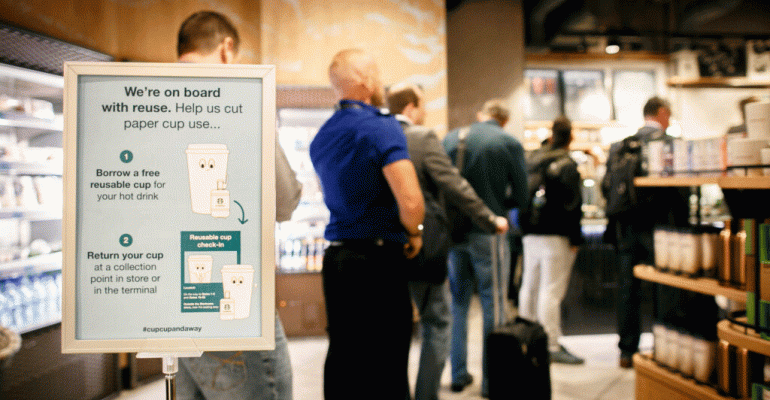Two of Starbucks’ largest company-wide investments in 2019 are delivery and sustainability: Starbucks Delivers announced its largest expansion yet to five major U.S. markets in April, and the coffee giant is also a major sponsor of the NextGen Cup Challenge, which offered $1 million for the most viable designs for recyclable cups for hot and cold beverages. So, it makes sense that Starbucks would continue to test out tactics in international markets to address the growth of its delivery services and sustainability solutions.
Reusable cups: London
After being a founding corporate member of the NextGen Cup Challenge, Starbucks is putting its sustainability efforts into action with a different tactic: reusability. In April, Starbucks UK launched The Cup fund in collaboration with Hubbub, a British nonprofit environmental advocate, which would raise funds to support community recycling programs for coffee cups, offering grants between £50,000 and £100,000 ($63,469 to $126,939 USD).
On Monday, Starbucks announced the first-ever reusable cup trial at Gatwick Airport in London. The one-month trial will run at the Starbucks in Gatwick’s South Terminal, where guests will be offered the option of ordering their drink in a reusable cup. Customers will be able to keep the cup while they are in the airport, and once finished, customers can return cups to one of the five cup check-in points located throughout the airport terminal. Once returned, the reusable cups will be washed and sterilized before being used for someone else’s latte or Frappuccino.
“The purpose of working with Hubbub and Gatwick is to help create a new culture of reuse on-the-go by giving customers the option of a reusable cup instead of paper for free,” Jaz Rabadia MBE, UK Senior Manager of Energy and Sustainability at Starbucks, said in a statement. “Our goal is to save 7,000 disposable cups over the course of the month to find out the best ways to drive reuse where it is typically harder to do so — such as airports.”
This is a continuation of the program that Starbucks UK launched in 2018, which charges customers across the UK 5 pence to use a paper cup instead of a reusable cup. An initial trial in London saw a 126% increase in reusable cup usage. Similarly, guests who do not want to partake in the reusable cup program at Gatwick Airport will also be charged an additional 5 pence for their beverage.
Starbucks did not respond to requests for further details or whether the program will be coming to other international markets, including the U.S.
Ghost kitchens: China
Ghost kitchens or cloud kitchens — delivery-only kitchens that are not attached to a restaurant — are usually associated with smaller chains or independent restaurants looking to save on rent by cutting down on their physical footprint. But since Starbucks Delivers launched in China last year, the coffee giant has been using ghost kitchens to improve order efficiency and quality.
“[When a] consumer is placing an order for delivery, it doesn’t really matter where that is prepared,” Starbucks CFO Patrick Grismer said during Piper Jaffray’s 39th annual Consumer Marketplace Conference last week. “What the consumer cares about is that it is high-quality and is delivered in a timely fashion. And so they’re experimenting with hidden-kitchen type operations in China, and we’re learning from their experience to understand how we might bring a similar model to life in the U.S., particularly in large metro markets like New York.”
A Starbucks representative confirmed with NRN that the Starbucks Delivers team is partnering with Starbucks China’s delivery partner Alibaba and their Hema supermarkets to test out the efficiency of the cloud kitchen with their delivery service.
“Starbucks is the first retail brand to establish dedicated back-of-house kitchens, Star Kitchens, within Alibaba’s Hema supermarkets in China,” a Starbucks representative said. “The Star Kitchens are designed to Starbucks’ exact standards to handcraft the consistent quality coffee and tea beverages that customers have come to expect and love.” Starbucks launched its Star Kitchens in two Hema stores in Shanghai and Hangzhou in October 2018.
During the Piper Jaffray conference, Grismer also noted that the Starbucks Delivers team in both the U.S. and China markets have been experimenting with different delivery menus, and taking items off the menu that simply don’t deliver well, like foam-topped beverages.
“I know a macchiato or a cappuccino — something that has foam —doesn’t hold up well after 20 minutes,” Grismer said. “So there were certain products that were removed from the delivery menu, so that we could, with confidence, enter into delivery knowing that our consumers would be having a comparable high-quality product and service experience.”
A Starbucks representative confirmed that although “a small selection of menu items” were removed because their quality was impacted during travel time, “the vast majority” of the menu is available in markets where Starbucks Delivers is offered.
Contact Joanna Fantozzi at [email protected]
Follow her on Twitter: @JoannaFantozzi

